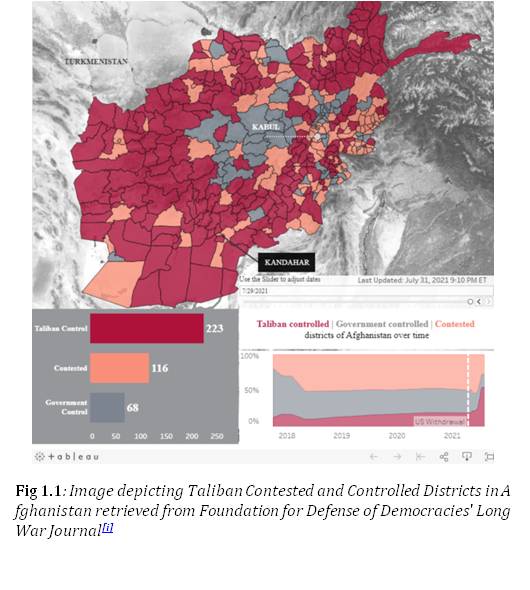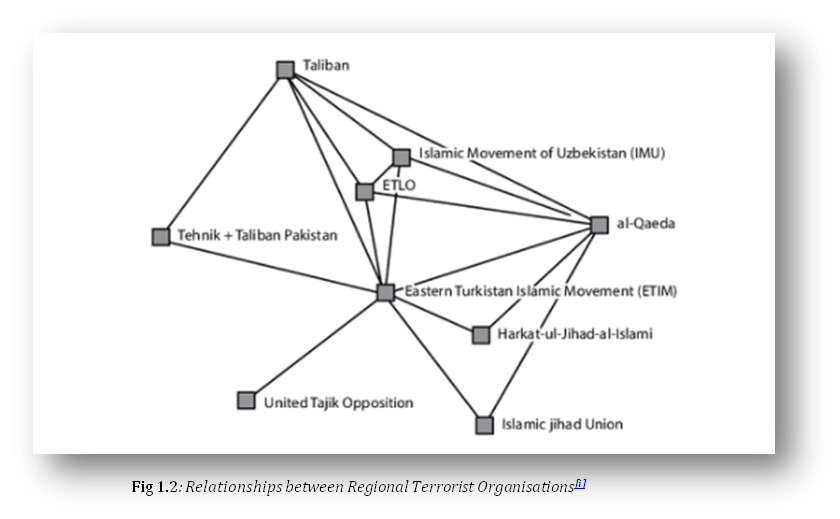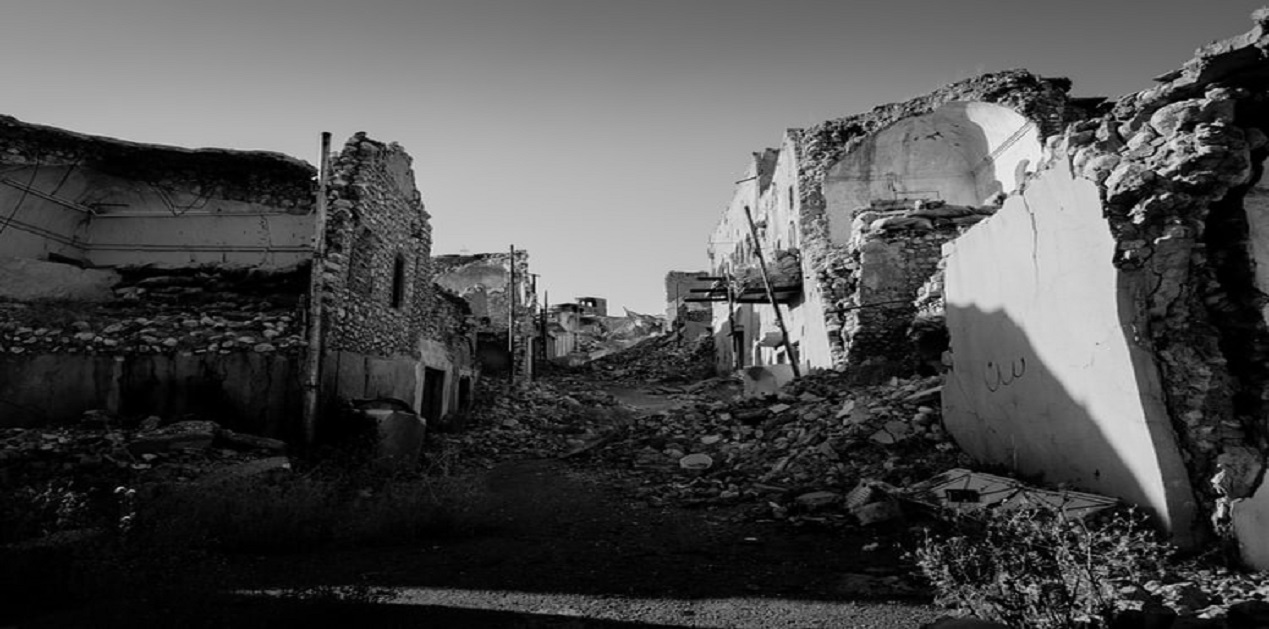The U.S. withdrawal from Afghanistan will have a profound impact on Asian geopolitics and international relations at large. China-Pakistan relations are also undergoing steady change as both seek to maximise their influence, security and economic interests in Afghanistan. Given the uncertain future of Afghanistan in conjunction with its turbulent past, China-Pakistan relations will be tested on multiple fronts, be it forming new alliances or ensuring security on two ends of China Pakistan Economic Corridor (CPEC): Kashgar in Xinjiang and Gwadar in Balochistan. Even though China has managed to counter terrorist threats in Xinjiang, the Taliban's resurgence in Afghanistan may pose a severe security threat to its mainland. While China maintains a political relationship with the Taliban and continues to negotiate with it, the latter's association with other terrorist outfits can pose a significant threat to Beijing's stability in its northwestern region. It's unlikely that Pakistan will end its support for the Taliban; however, the situation in Afghanistan will pose a significant threat to Islamabad's stability in the western region. Thus, the ongoing crisis in Afghanistan will impact China-Pakistan relations.
Afghanistan's Uncertain Future
The global community has often questioned the Afghan government's ability to survive vis-à-vis the Taliban's return in an Afghanistan with no U.S. security forces. Some analysts have gone beyond the power struggle between Afghan government and the Taliban by warning against the resurgence of warlords and militias in the region. For now, three scenarios are expected based on consequential possibilities: 1) Fall of the Afghan government, 2) Establishment of Taliban led Islamic Emirate, and 3) The déjà-vu of multiple rivalries and 1996 Afghan civil war. Each of these possibilities will impact adversely the stability and security in the region, having global consequences.
The Afghan government projects the willingness to 'coexist' peacefully with the Taliban. However, the Taliban's increased violence and atrocities in the region has disillusioned the ordinary Afghan people. The Afghan government and security forces project readiness to deal with the Taliban challenge. In an article published in the Foreign Affairs, the Afghan President, Ashraf Ghani, said that "The risks of the U.S. withdrawal have been widely propagated in the news media, but we see little serious discourse about the opportunities it presents. All international stakeholders and the Afghan people want a sovereign, Islamic, democratic, united, neutral, and connected Afghanistan."1 In addition to that, Former President Hamid Karzai, in an interview with the Russian media, said, "the Taliban will be defeated by Afghans and the people will confront them and will form an uprising against them if the group continues its violence."2
While the Afghan government seeks to manage the offensive Taliban's moves post-U.S. withdrawal, the future of Afghanistan is uncertain. According to the latest data collected by the Foundation for Defense of Democracies' Long War Journal, the Taliban has successfully taken control of 223 districts, leaving 116 as contested and 63 under the Afghan government's control.3 Moreover, the tug of war between different clans in Afghanistan will lead to security and economic challenges for China and Pakistan, eventually affecting both countries' 'all-weather friendship'.

The Complexity of Afghan Society
Afghanistan is a diverse society having complex socio-cultural relations based on linguistic, religious and ethnic identities. While it's a Muslim majority country, there are internal divisions as ethnic clans living in Afghanistan comprise tribal and sub-tribal groups5. As a society, Afghanistan has been a battleground of political power, sectarian tensions between Shia and Sunni populations and ethnic groups spilling over to neighbouring countries. This has led to foreign entities, most notably Pakistan supporting the Taliban in the region.
Following the withdrawal of Soviet Union troops from Afghanistan in the early 1990s, the Taliban grew in the northern Pakistan. Since its inception in early 1990s, Taliban has aimed to enforce their version of Sharia, or Islamic Law. With the withdrawal of U.S. troops, Taliban again aims to impose its austere version of Islamic Emirate.
Grave Human Rights Violations
The fall of the Afghan government will jeopardise Afghanistan's stability as the Taliban will seek to establish an Islamic Emirate. Taliban's vision of Afghanistan poses a severe ideological, socio-cultural and economic threat to Afghan people. There are frequent attacks on the ethnic minorities in Afghanistan, and women and girls are pushed indoors. The situation in Afghanistan will lead to grave human rights violations and the end of peace for ordinary Afghan people. As a result, they will seek refuge in neighbouring countries, making it a security threat for Afghanistan's neighbours. Moreover, militias and warlords see the Taliban as a threat to their ideological and personal interests. All ethnic clans of Afghanistan, be it Pashtuns, Tajiks, Hazaras or Uzbeks, seek a share of power.
China's Interests in Afghanistan
Afghanistan's Geography
Afghanistan's geography, places it at the crossroads of three regions i.e. South Asia, Central Asia, and South-West Asia makes it strategically important for China's regional and global ambitions. China has strategic, security and economic interests in Afghanistan as they serve its rise to superpower status. China shares a small 76 km border with Afghanistan at tri-junction of both countries with Pakistan occupied Kashmir and ending at tri-junction with Tajikistan. The short border is located in the rural northeast of Afghanistan and at the end of the Wakhan corridor. The thinly populated Wakhan' panhandle' links mainland Afghanistan with the Kashghar, prefecture of mainland Xinjiang. On the Chinese side, the border is located in the Chalachigu Valley. Several mountain passes cross the border, including Wakhjir Pass in the south and Tegermansu Pass in the north. China-Afghanistan border is distant from urban centers on both sides.
Afghanistan's Significance in China's Superpower Ambitions
China's immediate interests in Afghanistan include ensuring the safety of its citizens, stabilising its border in the Wakhan corridor in Badakshan province, minimising the security threat in Xinjiang and protecting its investment and Belt and Road Initiatives (BRI) projects in Afghanistan6. Through Afghanistan, China seeks to join the 'five connectivities' of BRI. In addition, it is concerned about protecting its economic interests in Afghanistan: Investments in the Aynak copper mine, energy interests in the Amu Darya basin, and Bamiyan resources7.
Afghanistan's stability is directly linked to China's politico-strategic interests in the long run, significant for its Great Power rivalry with the United States. Like other regional powers, India, Iran, and Russia, China wants stability in Afghanistan. However, China's perception of stability is limited to preventing ethnic spillover to its Xinjiang province.
Global Jihad's support of Uyghur Muslims
The Xinjiang Uygur Autonomous Region is a province located at China's far west borders with Mongolia, Russia and five Central Asian states— Pakistan, Afghanistan, Tajikistan, Kyrgyzstan and Kazakstan8. China's efforts to urbanise and homogenise its northwestern region have lead to grave human rights violations of Uyghur. The Uyghur Muslims see China's Mandarin imposition, political and education indoctrination, restrictions on religious practices and authorities, and economic inequalities as a threat to their culture and home in Xinjiang9. China has often blamed the western countries and global media's support of Uyghur Muslims as interference in its internal affairs and propaganda to tarnish its international image. However, China's treatment of Uyghur Muslims invites criticism from global jihadists too.
The Eastern Turkestan Islamic Movement (ETIM), largely regarded as a terrorist organisation, is the most active terrorist outfit operating in Xinjiang. United States, Pakistan, United Kingdom, among other nations with the United Nations, have listed the ETIM as a terrorist organisation10. ETIM envisions creating an independent 'Uighurstan' or 'East Turkistan' comprising a geographical area that would include parts of Turkey, Kazakhstan, Kyrgyzstan, Uzbekistan, Afghanistan and the Xinjiang region of China11. Its members are known to have associations with other jihadist groups such as the Taliban in Afghanistan, Hay'at Tahrir al-Sham (HTS) in Syria, and the Islamic Movement of Uzbekistan (IMU) in Central Asia12.

Al-Furat, a Province in Islamic State located in the Euphrates Province in Western Iraq, released a video revealing Uyghur fighters in its ranks14. In March 2017, the video message I.S. displayed its anti-China agenda. In the video, the Uyghur fighters vowed to return to their homeland and "shed blood like rivers and avenging the oppressed" in attacks against Chinese targets15. The video coverage initially reported by Al-Jazeera got deleted owing to China's efforts to curb the Jihadist threat and propaganda. Most of the Chinese targets are Han Chinese and critical infrastructure projects such as railways. In the past, China has been a victim of severe violent attacks like riots, arson, knife attacks and bombings allegedly launched by Uyghur militant separatists.
Taliban calls China a friend and assured the safety of Chinese workers and infrastructure projects in Afghanistan. Taliban spokesperson Mohammed Suhail Shaheen has assured China that the Taliban will not allow "anyone or any group to use Afghan soil against China or any other countries"16. It needs to be watched if the Taliban's promises are genuine or a trap to legitimise its coercive rule in Afghanistan by seeking recognition from China.
Pakistan's Association with the Taliban
In a recent high-level conference initiated by Uzbek President Shavket Miriziev to discuss connectivity between Central Asia and South Asia, Afghan President Ashraf Ghani openly blamed Pakistan for the situation in Afghanistan. He accused Pakistan of its support of the Taliban. In Foreign Affairs, the Afghan President wrote, "It is not too late for Pakistan to emerge as a partner and stakeholder in an orderly peace process. 17 " He also said that "If Pakistan chooses to support the Taliban, however, then Islamabad would be opting for enmity with the Afghan nation and would be foregoing the enormous economic benefits that peace and regional connectivity would offer.18 " Unfortunately, Pakistan's disassociation with Taliban is easier said than done.
Pakistan's support of the Taliban has primarily been directed at undermining and attacking India's goodwill in Afghanistan. Pakistan's support of the Taliban poses a significant threat to Afghan people and regional and global security. Even though in a recent high-level conference, Pakistani Prime Minister Imran Khan said "it's unfair to blame Pakistan for situation in Afghanistan", Islamabad has assisted the Afghan Taliban for three decades to seize power and attack India's generous efforts to support and empower Afghan people.
Pakistan has an international obligation to stop its support of the Taliban. Pakistan is a member of the Shanghai Cooperation Organisation (SCO), Economic Cooperation Organisation (ECO) and South Asian Association of Regional Cooperation (SAARC) - all of which are committed to countering terrorism in the region.
Understanding Pakistan Taliban nexus
Pakistan's military leadership and Prime Minister Imran Khan's Pakistan Tehreek-e-Insaf government are repeatedly emphasising that only a political settlement can end the conflict in Afghanistan. According to him Pakistan does not want a Taliban victory and does not have close ties with them. Thus, a narrative is being built wherein Pakistan is playing a victim card. They are painting themselves as being left to fend for themselves after the withdrawal of U.S. troops, and that they are going to be bearing the brunt of the chaos and civil war in Afghanistan.
In an article in the Washington Post, Pakistan PM Imran Khan stated that Pakistan opposes any military takeover of Afghanistan, which will lead only to decades of civil war. He further mentioned, "In the past, Pakistan made a mistake by choosing between warring Afghan parties, but we have learned from that experience. We have no favourites and will work with any government that enjoys the confidence of the Afghan people. He also stated that Pakistan country has suffered so much from the wars in Afghanistan. Moeed Yusuf, Pakistan's National Security Advisor mentioned Pakistan was very concerned with the altering scenario following the U.S. drawdown which could be adversely affected by the rising violence and civil warfare in Afghanistan. "The region's peace is conditional on peace in Afghanistan," he added.
However, the reality is that Islamabad has assisted the Afghan Taliban for three decades to seize power and attack India's efforts and infrastructure projects in Afghanistan. Pakistan is distinguished both by the sweep of its objectives and the scale of its efforts, which include soliciting funding for the Taliban, bankrolling Taliban operations, providing diplomatic support as the Taliban's virtual emissaries abroad, arranging training for Taliban fighters, recruiting skilled and unskilled workforce to serve in Taliban armies, planning and directing offensives, providing and facilitating shipments of ammunition and fuel, and on several occasions apparently directly providing combat support19. During a security briefing to Pakistani lawmakers, top generals of the Pakistan Army described the Afghan and Pakistani Taliban as "two sides of the same coin because of their ideological connection20. This revelatory statement says a lot about Pakistan's pernicious intentions and its entrenched support to the Taliban.
In a recent high-level conference initiated by Uzbek President Shavket Miriziev to discuss connectivity between Central Asia and South Asia, Afghan President Ashraf Ghani openly blamed Pakistan for the situation in Afghanistan. He accused Pakistan of its support of the Taliban. In fact, multiple reports suggest that the Taliban roam around freely in parts of Pakistan, and rallies are being conducted in support of the Taliban. There are also indications of Pakistani nationals fighting in Afghanistan and several of them returning injured, and some dead bodies being sent back. Other than that, Taliban fighters are being treated in Pakistani hospitals, and Pakistani supply lines to the Taliban are still open. Moreover, there is increasing support for the Taliban in the tribal areas of Pakistan.
Pakistan, in particular, is forecast to bear the brunt of the blowback from such a situation. Hence increased instability in Afghanistan will have a spillover effect on Pakistan as mentioned below:-
- The refugee crisis and internal displacement of Afghan nationals
- A rise in ethnic conflicts
- Pakistan's radical groups and their sanctuaries will find it a ripe opportunity to recruit and strengthen its cadres.
- Rise in radicalisation in Pakistan
- Ripple effect on Pakistan's economy
In fact, recently significant upsurge in terrorist incidents has been reported from different parts of Pakistan. The Tehreek-i-Taliban (TTP) is reportedly involved in these attacks. The Afghan Taliban is gaining a strong foothold in Afghanistan post the peace agreement and the U.S. troop withdrawal, which may enable the TTP to redeploy its resources in Pakistan.
Hence no matter what Pakistani officials say publicly, the country's military leadership wants a Taliban regime in Kabul to replace the Ghani government.
Strained China-Pakistan Relations and CPEC
One of the most significant aspects of China-Pakistan relations is the China Pakistan Economic Corridor (CPEC) that serves as the "crown" of Beijing's BRI project. China and Pakistan see CPEC as a catalyst to stabilise Pakistan's tottering economy by giving access to oil and energy-rich West Asia ports. In addition, both sides believe the CPEC would improve railway infrastructure and connectivity in Pakistan.
On July 14, thirteen people, including nine Chinese nationals, were killed when a blast occurred in the bus taking workers to the 4,300-MW Dasu hydropower project in the Upper Kohistan area of Pakistan's Khyber-Pakhtunkhwa province. The Dasu hydropower project is a part of the China Pakistan Economic Corridor (CPEC). According to some Chinese analysts, the Pakistan Taliban could be behind the bus attack, reported South China Morning Post21. Even though no group claimed responsibility for the attack, the analysts said the Pakistan Taliban operates in the region22. However, attacks on Chinese workers in Pakistan are not new. With the resurgence of the Taliban in Afghanistan, these threats are likely to increase.
Pakistan foreign office initially responded by calling the incident an accident caused by mechanical failure. However, later Pakistan's information minister Fawad Chaudhry stated, "the traces of explosives had been found in the vehicle and terrorism couldn't be ruled out in the incident". The recent incident triggered a strong response from China, as its initial reaction was to cancel the 10th Joint Coordination Committee meeting. It subsequently also suspended the work on the Dasu hydropower project. The attack certainly has brought some tensions in China Pakistan relations. However, this is unlikely to have a major impact on the China Pakistan deep strategic nexus.
Pakistan Afghanistan ties remain strained and stooped to a new low when the daughter of the Afghan envoy was kidnapped and injured in Pakistan. In a big setback to Pakistan, Afghanistan has withdrawn its diplomats as a response to the kidnapping. However, no matter what happens, Pakistan will not end its support for the Taliban. Therefore, India and the International community should ramp up their efforts to expose the Pakistan-Taliban nexus.
Conclusion
The complete withdrawal of U.S. troops from Afghanistan before September 11 is turning out to be a complicated affair. Taliban is gaining a strong foothold in Afghanistan. Taliban has not shown any seriousness in negotiations over intra-Afghan dialogue and has formulated a strategy to control Kabul. Global and regional powers like Pakistan, Iran, China and Russia have political and economic stakes in the ongoing conflict in Afghanistan. However, Pakistan seeks to maximise its influence, security and economic interests in Afghanistan. China also remains ambivalent about the U.S. troop withdrawal from Afghanistan. Therefore, the China Pakistan nexus is likely to get deeper and more robust. However, it needs to be seen if the Taliban fulfils its promises made to China. No matter what happens, the future of Afghanistan hangs in the balance, as there remain myriad uncertainties and complexities.
Endnotes
- Ghani, A. (2021, May 4). Afghanistan’s Moment of Risk and Opportunity. Foreign Affairs. https://www.foreignaffairs.com/articles/afghanistan/2021-05-04/ashraf-ghani-afghanistan-moment-risk-and-opportunity
- TOLOnews. (2021, August 3). Taliban ‘Will Be Defeated’ If No Political Settlement: Karzai. https://tolonews.com/afghanistan-173947
- Hegseth, P. (2021, July 27). Mapping Taliban Contested and Controlled Districts in Afghanistan.FDD’s Long War Journal.https://www.longwarjournal.org/mapping-taliban-control-in-afghanistan
- Hegseth. Ibid (2021, July 27).https://www.longwarjournal.org/mapping-taliban-control-in-afghanistan
- Van de Goor, L., & Van Leeuwen, M. (2000). The Netherlands and Afghanistan: Dutch Policies and Interventions with regard to the Civil War in Afghanistan (pp. 13-42, Rep.). Clingendael Institute. Retrieved July 24, 2021, from http://www.jstor.org/stable/resrep05380.6
- Kondapalli, S. (2021, July 18).Beijing too is worried over how to deal with Taliban. Deccan Herald. https://www.deccanherald.com/opinion/panorama/beijing-too-is-worried-over-how-to-deal-with-taliban-1009903.html
- Kondapalli Ibid. (2021, July 18). https://www.deccanherald.com/opinion/panorama/beijing-too-is-worried-over-how-to-deal-with-taliban-1009903.html
- Yee, H. S. (2003). Ethnic Relations in Xinjiang: A survey of Uygur-Han relations in Urumqi. Journal of Contemporary China, 12(36), 431–452. https://doi.org/10.1080/10670560305475
- Yee Ibid (2003) .https://doi.org/10.1080/10670560305475
- EASTERN TURKISTAN ISLAMIC MOVEMENT. (n.d.). United Nations Security Council. Retrieved July 24, 2021, from https://www.un.org/securitycouncil/sanctions/1267/aq_sanctions_list/summaries/entity/eastern-turkistan-islamic-movement
- EASTERN TURKISTAN ISLAMIC MOVEMENT. Ibid https://www.un.org/securitycouncil/sanctions/1267/aq_sanctions_list/summaries/entity/eastern-turkistan-islamic-movement
- Roul, A. (2019). Al-Qaeda and Islamic State Reinvigorating East Turkistan Jihad.Terrorism Monitor, 17(10).https://jamestown.org/program/al-qaeda-and-islamic-state-reinvigorating-east-turkistan-jihad/
- Ibid.
- Roul. Ibid(2019) https://jamestown.org/program/al-qaeda-and-islamic-state-reinvigorating-east-turkistan-jihad/
- Roul. Ibid(2019) https://jamestown.org/program/al-qaeda-and-islamic-state-reinvigorating-east-turkistan-jihad/
- B. (2021, July 11). Taliban resurgence raises terror fears from Moscow to China. The Economic Times.https://economictimes.indiatimes.com/news/defence/taliban-resurgence-raises-terror-fears-from-moscow-to-china/articleshow/84312331.cms?from=mdr
- Ghani. Ibid (2021) https://www.foreignaffairs.com/articles/afghanistan/2021-05-04/ashraf-ghani-afghanistan-moment-risk-and-opportunity
- Ghani. Ibid (2021) https://www.foreignaffairs.com/articles/afghanistan/2021-05-04/ashraf-ghani-afghanistan-moment-risk-and-opportunity
- Team, S. (2021, August 1). Worldwide Condemnation Of Pakistan For Attempt To Force Takeover Afghanistan Using Pakistan Army’s Taliban Units -. NewsCom World. https://newscomworld.com/2021/08/01/worldwide-condemnation-of-pakistan-for-attempt-to-force-takeover-afghanistan-using-pakistan-armys-taliban-units/
- C. (2021b, July 17). Two Sides of the Same Coin? Chanakya Forum. https://chanakyaforum.com/two-sides-of-the-same-coin/
- Mai, J., Zheng, S., & Zheng, R. (2021, July 21). Pakistani Taliban may be behind bus attack that killed 9 Chinese, analysts say. South China Morning Post.https://www.scmp.com/news/china/diplomacy/article/3141819/pakistani-taliban-may-be-behind-bus-attack-killed-9-chinese
- Mai, Zheng&Zheng. Ibid. https://www.scmp.com/news/china/diplomacy/article/3141819/pakistani-taliban-may-be-behind-bus-attack-killed-9-chinese
(The paper is the author’s individual scholastic articulation. The author certifies that the article/paper is original in content, unpublished and it has not been submitted for publication/web upload elsewhere, and that the facts and figures quoted are duly referenced, as needed, and are believed to be correct). (The paper does not necessarily represent the organisational stance... More >>
Image Source: https://images.unsplash.com/photo-1580922110301-a666f6745565?ixid=MnwxMjA3fDB8MHxwaG90by1wYWdlfHx8fGVufDB8fHx8&ixlib=rb-1.2.1&auto=format&fit=crop&w=750&q=80












Post new comment